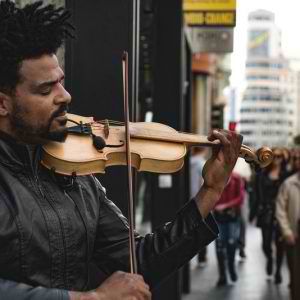[bctt tweet="You could have the best ideas but that will never be enough. To ascend to the apogee of excellence, ideas and capabilities require context." username="QaziniKenya"]
When I binged on Man On Fire, a 2004 action-thriller film starring Denzel Washington, I was struck by a dialogue between two characters whose words will forever remain etched on my mind. John Creasy (played by Denzel Washington), bodyguard to nine-year-old Lupita Ramos, says the words to her while giving her swimming lessons. He cradles in his palm a stopwatch that keeps the time as the little girl strokes and glides to the end of the pool. She manages to beat the clock and triumphantly yells, ‘I am tough!’ Her bodyguard’s response comes: There’s no such thing as tough. There’s trained, and untrained.
The concept of trained vs untrained once opened a discussion at a writers' meetup in Nairobi: Why are there very good writers, ‘trained’ writers, who remain unknown, with their works attracting little to no attention? Does talent alone pay? Could your business, idea, proposal; be the best there is but still you fail to hit the expected goal?
In his book, Free Play: A creative life is risky business, Stephen Nachmanovitch writes, To follow your own course, not patterned on parents, peers, or institutions, involves a delicate balance of tradition and personal freedom, a delicate balance of sticking to your guns and remaining open to change. During the discussion we had on the writers' meetup, I noted that while it is tough for individuals to follow their innate passions, mostly because of the sad nature of societal expectations, it is tougher to train and build inner potential while equally putting in work to expose oneself out there.
If our talent and ideas are supposed to be held up under the shine of the world, then what vehicle is there to drive our abilities to that place under the shine? The answer lies in striking a good balance between content and context. This concept is aptly illustrated in the story of Joshua Bell, arguably one of the greatest violinists of our time. In 2007, just over a week after he had successfully performed at a show accompanied by other great musicians, Joshua Bell decided to disguise himself in a hoodie and baseball cap and took to the street to play his violin, next to a garbage can. In the first instance, his brand had been all out, his friends supported him, and thousands came out and paid to watch him play. In the second instance, disguised as just another street violin player taking donations, very few people paid him any attention. Apparently, both of Bell’s performances had been carefully planned by The Washington Post in a study designed to unearth human perceptions. Was the violin street performer as talented as the one that performed at the grand show? Yes. Why then didn’t people pay attention to him the second time? The context.
You could have the best ideas but that will never be enough. To ascend to the apogee of excellence, ideas and capabilities require context. And context can be broken down into the following:
1. The people around you: Are they supportive? Do they fall under constructive or obstructive company? After you put in countless hours in building your capabilities, whom do you walk with on the path to carve your name on the wall of greatness? Do they lift you up under the shine or dim your light?
2. The platforms you expose yourself to: You may have a business idea, but only expose it to family and friends, or you may have an idea and boldly sign up for business seminars where proposals are presented in front of would-be investors. Which scenario would bear more fruit? Sometimes what we are looking for is also looking for us, and we need to muster the courage to take the risk and step out there. You could have what it takes, but are you fearlessly putting yourself out there?
3. Personal/ Organizational brand: Your brand tells the story of who you are and what you do. The process of branding which includes considering your target market, the best platform, who to work with, when to brand, how to brand, how to build the brand, the available budget all come to bolster and arm the capabilities you already have. Is your brand telling an explosive story that can’t be ignored?
4. Consistency: You could have what it takes, but that doesn’t mean you have a free pass to greatness. The key lies in consistency; that constant movement towards your goals even when you fail. Consistency in doing your research on what works and what does not work. Couple that with priceless lessons handed to you by the failure you encounter; because failure shouldn’t cut our feet from under us, it should teach our feet where to tread next time and guide us to the right context.
It's amazing to see what happens when refined content gets bracketed in the right context. Let’s circle back to where we started. Which one are you: trained, or untrained? And, is your content in the right context?





